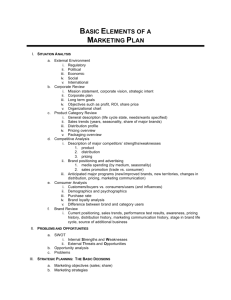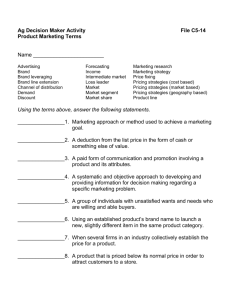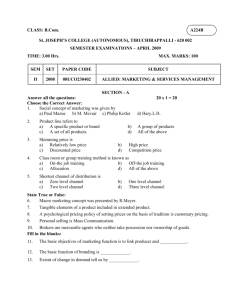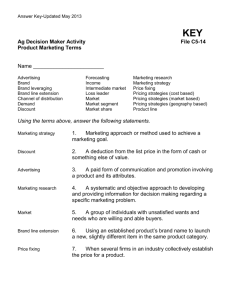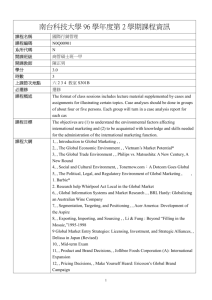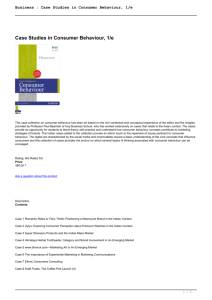Name of Course
advertisement
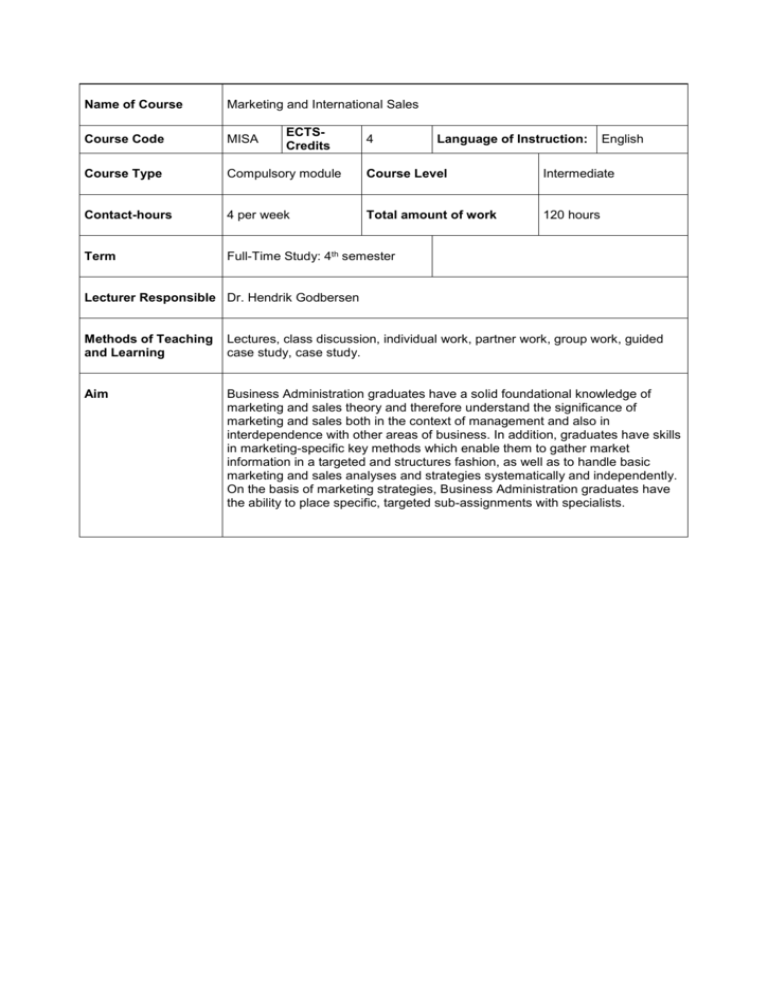
Name of Course Marketing and International Sales Course Code MISA Course Type Compulsory module Course Level Intermediate Contact-hours 4 per week Total amount of work 120 hours Term Full-Time Study: 4th semester ECTSCredits 4 Language of Instruction: English Lecturer Responsible Dr. Hendrik Godbersen Methods of Teaching and Learning Lectures, class discussion, individual work, partner work, group work, guided case study, case study. Aim Business Administration graduates have a solid foundational knowledge of marketing and sales theory and therefore understand the significance of marketing and sales both in the context of management and also in interdependence with other areas of business. In addition, graduates have skills in marketing-specific key methods which enable them to gather market information in a targeted and structures fashion, as well as to handle basic marketing and sales analyses and strategies systematically and independently. On the basis of marketing strategies, Business Administration graduates have the ability to place specific, targeted sub-assignments with specialists. Course Target / Learning Target (Competencies) Professional Competencies After completion of the module students are able to understand the process and structure of marketing and buyers oriented business administration the influences and processes of consumer behaviour impact of strategic marketing to business management the integrative role of brand management the development and management of products pricing strategies the system and process of integrated communication elements of communication and selling the management of brand portfolios the specifics of B2B marketing Methodological Competencies After completion of the module students are able to use information about the demand side for strategic and operative marketing planning create strategic concepts referring to market oriented business administration and brand management use instruments of product development and product management to deliver a core value to customers and to gain profit for a company evaluate prices and define effective pricing strategies plan and manage integrated campaigns of communication and selling use appropriate marketing strategies and instruments to face the challenges of B2C and B2B marketing Students will be able to use the mentioned skills on a basic to medium level. Course Content/ Learning Content Topics Learning Block 1 (Introduction into Marketing) Organisation and administration Structure, process and change of markets Systems and processes of marketing management Key concepts of markets and marketing Topics Learning Block 2 (Consumer Behaviour) Structure of influences on consumer behaviour Social influences on consumer behaviour as culture and groups Intrapersonal processes as perception, learning, memory, problem solving Intrapersonal factors: attention, emotion, motivation, attitudes, personality, life styles Psychological theories of behaviour Topics Learning Block 3 (Segmenting and Targeting) The role of segmenting and targeting in the marketing process Variables and methods of segmenting Techniques of targeting Topics Learning Block 4 (Strategic Frame & Positioning) Objectives and decisions of strategic marketing Process of strategic marketing Overview the state-of-the-art brand management models Strategic marketing management and positioning with the integrated brand management system BrandingStar Process of positioning Defining customer interfaces and developing interfaces strategies Topics Learning Block 5 (Product Marketing) Concepts of products from the seller’s and the buyer’s point of view Attributes of products Analysing and developing products Dealing with tangible and intangible goods Topics Learning Block 6 (Pricing) Fundamentals of pricing theory Price perceptions Management Opportunities in pricing Pricing methods Topics Learning Block 7 (Integrated Marketing Communications) Process of communication Management process of marketing communication Psychological, behavioural, and management factors influencing the economic success of communication Impact and techniques of integration of communication Topics Learning Block 8 (Mass Communications) Specifics and objectives of mass communications Deciding on media Development of advertising messages Analysing and developing advertisements Topics Learning Block 9 (Sales Promotion, Events, PR) Objectives of sales promotion, event marketing, and public relations Opportunities and limitations of sales promotion, event marketing, and public relations Instruments and processes of sales promotion, event marketing, and public relations Topics Learning Block 10 (Personal Selling) Objectives and strategies of selling Management of sales organisations Process of personal selling Effective behaviour on the single steps of the process of personal selling Topics Learning Block 11 (Direct Marketing) Specifics of direct marketing Instruments of direct marketing Objectives of direct marketing Development of direct marketing advertisements Topics Learning Block 12 (Managing Brand Portfolios) Composite effects of the supply and the demand side Structure of brand extensions Opportunities and threats of brand extensions Brand architectures Topics Learning Block 13 (B2B-Marketing) Behaviour of organisations Specifics of B2B-marketing in comparison to B2C-marketing Topics Learning Block 14 (Integrative View on Marketing with the Management System BrandingStar) Holistic structure of the BrandingStar Management process of the BrandingStar Course Structure Teaching material Contact Hours Guided Self-Study Self-Study: review contact hours material solve case studies read litriture prepare for exams lecture notes practicle examples and case studies current articles from professional journals Kotler, P., Keller, K.L. (2009). Marketing Management (13th ed.). Upper Saddle River, NJ: Pearson. Module Requirements as per model syllabus Efficiency Rating conducting case studies Final module exam (120 minutes) at the end of semester Subsequent Courses as per model syllabus
